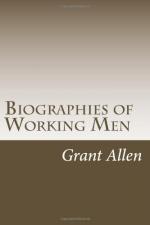Under these circumstances, George Stephenson, eager and anxious for further knowledge, took a really heroic resolution. He wasn’t ashamed to go to school. Though now a full workman on his own account, about eighteen years old, he began to attend the night school at the neighbouring village of Walbottle, where he took lessons in reading three evenings every week. It is a great thing when a man is not ashamed to learn. Many men are; they consider themselves so immensely wise that they look upon it as an impertinence in anybody to try to tell them anything they don’t know already. Truly wise or truly great men—men with the capability in them for doing anything worthy in their generation— never feel this false and foolish shame. They know that most other people know some things in some directions which they do not, and they are glad to be instructed in them whenever opportunity offers. This wisdom George Stephenson possessed in sufficient degree to make him feel more ashamed of his ignorance than of the steps necessary in order to conquer it. Being a diligent and willing scholar, he soon learnt to read, and by the time he was nineteen he had learnt how to write also. At arithmetic, a science closely allied to his native mechanical bent, he was particularly apt, and beat all the other scholars at the village night school. This resolute effort at education was the real turning-point in George Stephenson’s remarkable career, the first step on the ladder whose topmost rung led him so high that he himself must almost have felt giddy at the unwonted elevation.
Shortly after, young Stephenson gained yet another promotion in being raised to the rank of brakesman, whose duty it was to slacken the engine when the full baskets of coal reached the top of the shaft. This was a more serious and responsible post than any he had yet filled, and one for which only the best and steadiest workmen were ever selected. His wages now amounted to a pound a week, a very large sum in those days for a skilled working-man.




